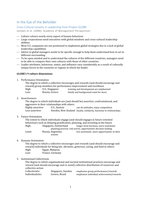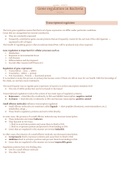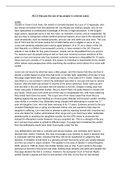Cross Cultural Lessons in Leadership from Project GLOBE
Javidan et al. (2006), Academy of Management Perspectives
Culture colours nearly every aspect of human behaviour
Large corporations need executives with global mindsets and cross-cultural leadership
abilities
Most U.S. companies are not positioned to implement global strategies due to a lack of global
leadership capabilities
Advice to global managers needs to be specific enough to help them understand how to act in
different surrounding
To be open minded and to understand the cultures of the different countries, managers need
to be able to compare their own cultures with those of other countries
Leader attributes, behaviour, status, and influence vary considerably as a result of culturally
unique forces in the countries or regions in which the leader
GLOBE’s 9 culture dimensions
1. Performance Orientation
The degree to which a collective encourages and rewards (and should encourage and
reward) group members for performance improvement and excellence
High: U.S., Singapore training and development are emphasised
Low: Russia, Greece family and background count for more
2. Assertiveness
The degree to which individuals are (and should be) assertive, confrontational, and
aggressive in their relationships with others
Highly assertive: U.S., Austria can-do attitudes, enjoy competition
Less assertive: Sweden, New Zealand loyalty, solidarity, harmony in relationships
3. Future Orientation
The extent to which individuals engage (and should engage) in future-oriented
behaviours such as delaying gratification, planning, and investing in the future
High: Singapore, Switzerland longer term horizons, more systematic
planning process; risk averse, opportunistic decision making
Least: Russia, Argentina less systematic, more opportunistic in their
actions
4. Humane Orientation
The degree to which a collective encourages and rewards (and should encourage and
reward) individuals for being fair, altruistic, generous, caring, and kind to others
High: Egypt, Malaysia
Low: France, Germany
5. Institutional Collectivism
The degree to which organizational and societal institutional practices encourage and
reward (and should encourage and re-ward) collective distribution of resources and
collective action
Collectivistic: Singapore, Sweden emphasize group performance/rewards
Individualistic: Greece, Brazil emphasize individual achievement/rewards
1












